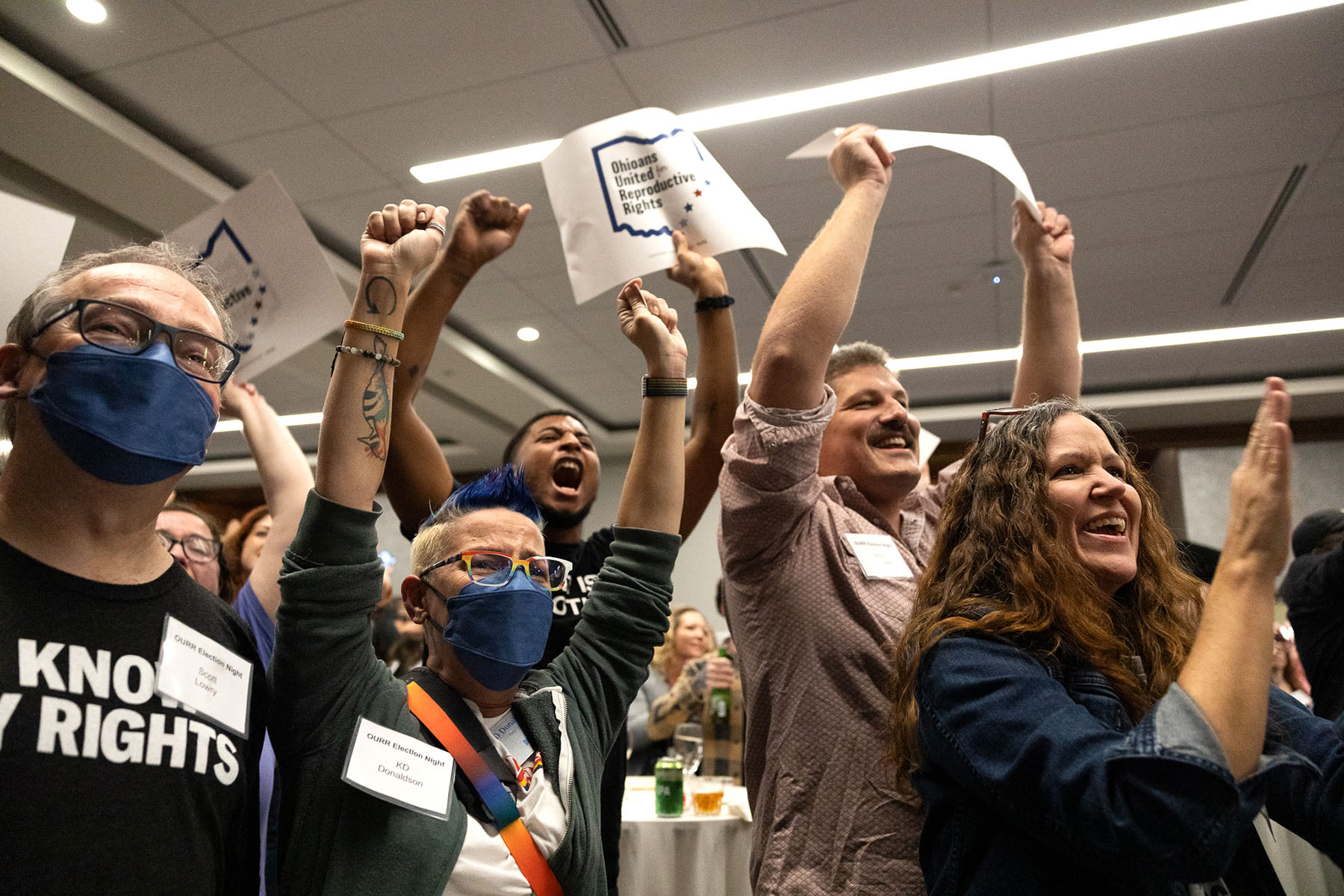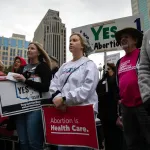At The 19th, we’re committed to publishing journalism that you can trust throughout the critical moments that shape our democracy and our lives. Show your support during our Fall Member Drive, and your donation will be matched. Double your gift today.
One month after Ohioans voted to protect abortion access, the constitutional amendment goes into effect Thursday — and while Republican leaders have mostly backed off plans to undermine the amendment in the near term, proposed legislation and pending litigation could still determine the scope of access.
In the November elections, about 57 percent of Ohioans voted to approve Issue 1, which enshrined the right to abortion until the point of fetal viability, as well as access to contraception, miscarriage care and fertility treatment in Ohio’s Constitution. In Ohio, as of Thursday, abortion is legal up to 22 weeks, which has been the case since the state’s six-week ban was put on hold by the courts in September 2022.
Even before the vote, some Republican legislators were already publicly exploring ways to undo or undercut its protections.
“We do recognize that they can continue to chip away at our democratic processes, so we have to stay very vigilant,” Lauren Blauvelt, the executive director of Planned Parenthood Advocates of Ohio, told The 19th.
-
Last Month:
“I believe we can win — just because they’re trying to do this doesn’t mean it’s inevitable — but it takes a lot of work and constant advocacy that can be really exhausting for Ohio citizens,” she added.
The GOP push to block Issue 1 started when Republicans put a separate measure onto August ballots that would have raised the threshold to pass citizen-offered constitutional amendments, including Issue 1; Ohioans soundly rejected that effort. Within hours of the November vote, Republican Senate President Matt Huffman told reporters it was the “beginning of a revolving door of ballot campaigns to repeal or replace” it, perhaps with another amendment that would implement a 15-week abortion ban. Then, far-right state Rep. Jennifer Gross, who represents an exurban district outside Cincinnati, announced an effort to strip the judiciary of its jurisdiction over the abortion amendment as an end-run around courts inclined to uphold the state constitution.
Other Republicans in the state have rejected proposals that would ignore the will of Ohio’s voters — but some still expressed their openness to other ways to restrict abortion. Gov. Mike DeWine, for example, said that once Issue 1 took effect, voter sentiment may change and open the door to a different amendment or new abortion laws. GOP House Speaker Jason Stephens rejected Gross’ idea and said that Republicans would abide by the state constitution, but he also said on election night that lawmakers would “protect innocent life,” before backtracking and saying their focus would not be on abortion but infant health.
Democratic House leader Rep. Allison Russo said in the month since Issue 1 was approved there has been “a lot of saber rattling from the Republicans, and the speaker, indicating we’d be in this nonstop back-and-forth of initiatives and efforts to overturn Issue 1.”
“Then, as it became clear that in many cases there were counties where this won where we have several Republicans serving, we saw a bit of a backing off of that . . . as well as a realization that overturning the will of the voters on this issue in particular was probably not politically strategic good thinking,” Russo said.
Ohio still has many abortion laws on the books that weren’t automatically nullified by Issue 1. Some, like the six-week abortion ban that was already put on hold by courts before the amendment passed, are currently being litigated — the Ohio Supreme Court has asked both sides of the case to submit briefs Thursday on Issue 1’s impact on the so-called heartbeat ban. A 20-week ban passed in 2016 — interpreted as allowing abortion up to 21 weeks and 6 days — is still in place, as is a 2019 prohibition on dilation and extraction, an abortion method most commonly used in the second trimester of pregnancy. Another law prohibits doctors from performing abortions requested due to a Down syndrome diagnosis for the fetus. A 2013 law that led to multiple clinic closures requires all abortion clinics to have transfer agreements with private hospitals.
Ohio’s Republican Attorney General, David Yost, who opposes abortion, stated in a legal analysis ahead of the election that if Issue 1 was approved, the “Heartbeat Act would not exist,” the 20-week ban and Down syndrome law would both be “invalidated,” and dilation and extraction would be again permitted. Reproductive rights advocates nevertheless expect anti-abortion groups to try to defend portions of these laws if or when they are challenged under Issue 1.
A federal judge earlier this week rejected a friend-of-the-court brief filed by anti-abortion groups in a case related to the transfer agreement law. U.S. District Judge Michael R. Barrett, nominated to the court by Republican President George W. Bush, is weighing Issue 1’s impact on the laws. He said the brief filed by the Ohio Christian Alliance, current and former Ohio lawmakers, an anti-abortion center and other groups “will not be of assistance in resolving or clarifying a question of law,” the Associated Press reported.
Jessie Hill, a law professor at Case Western Reserve University in Cleveland who is a cooperating attorney with ACLU Ohio on reproductive rights cases, said that she expects that the GOP legislature will continue to pursue legislation like the transfer agreement law that would curb access even as abortion itself remains legal.
“I think the lesson is that people need to keep paying attention to what the legislature is doing to restrict abortion access because not everything is going to be a big, flashy proposal,” Hill said.
Russo noted that GOP efforts are already underway in the legislature to increase government funding and establish tax incentives for anti-abortion centers. Such facilities, known as crisis pregnancy centers, counsel clients against abortion and provide little to no health care, despite often presenting themselves as health care facilities. Advocates also see implications in bills that aren’t directly tied to abortion: Planned Parenthood’s Blauvelt pointed to proposed legislation in the Ohio House to restrict gender-affirming care for transgender minors, saying it’s an attack on bodily autonomy that could have broader impacts if enacted.
“My sense is that we haven’t heard the last of it yet, but I think they’ll be careful about doing things in 2024 that will again mobilize the coalition that approved Issue 1,” said Herb Asher, a professor emeritus of political science at the Ohio State University.
Members of the coalition that backed Issue 1 all said they believed reproductive rights would continue to be salient in 2024, when all of Ohio’s state lawmakers will be up for reelection, along with three seats on its majority-conservative Supreme Court. Democratic U.S. Sen. Sherrod Brown will be defending his seat in one of just three races the Cook Political Report currently rates as a tossup, a race with the potential to determine control of the Senate and its ability to block national abortion restrictions. Plus, a bipartisan effort is underway to get a ballot measure before Ohio voters next year that aims to remove politicians from the once-a-decade redistricting process. Ohioans in 2022 voted with congressional and state legislative maps that had been invalidated multiple times by the state Supreme Court. Reproductive rights are expected to feature in all of these races.
“We see the 2024 ballot initiative supporting redistricting as essential to protecting access to reproductive health care,” Blauvelt said.
“Just as we heard loud and clear from our supporters and volunteers that they were ready to take on the responsibility of the citizen ballot initiative that became Issue 1, all of our supporters see redistricting as part of protecting abortion access and reproductive health care, as well as our democracy — it really does have a direct correlation,” she added.








